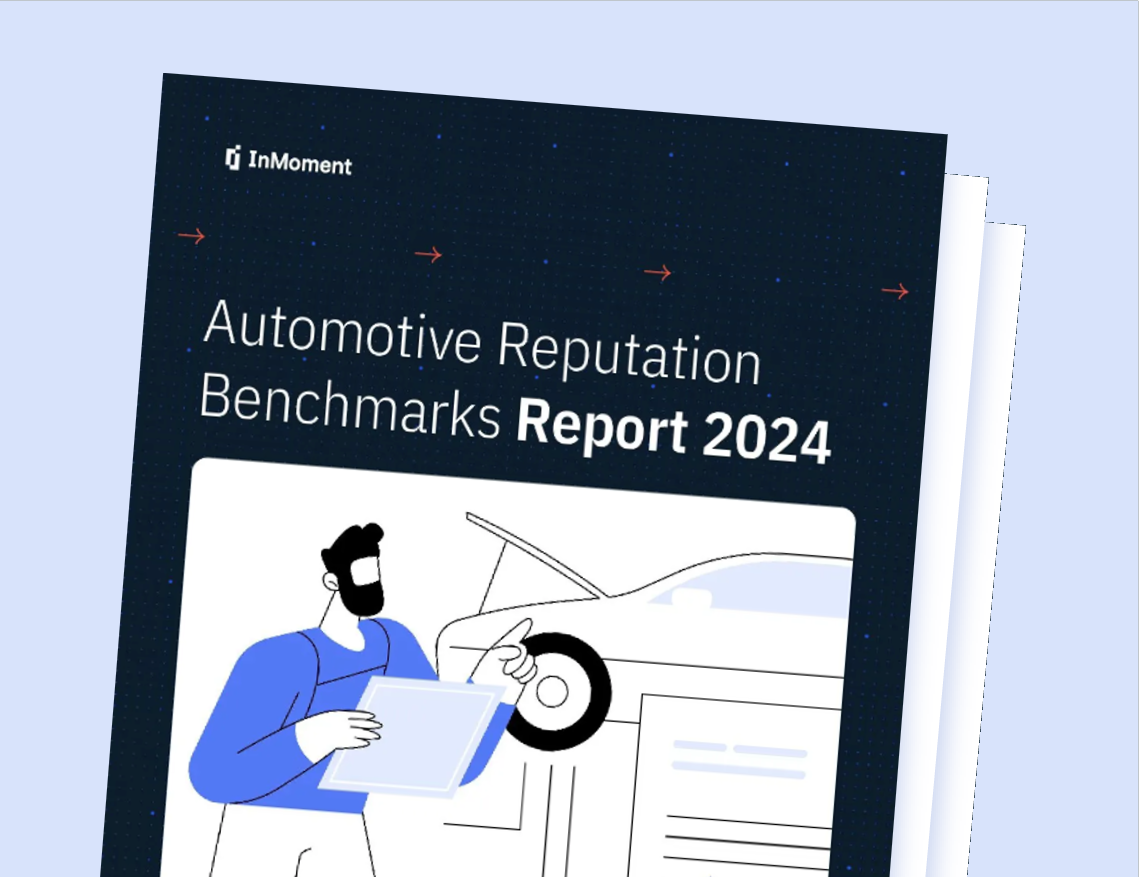A well-crafted automotive reputation management strategy is essential for any auto brand looking to build trust, foster customer loyalty, and thrive in a competitive market environment.
With online reviews, social media comments, and public customer feedback making a major impact on the reputation of automotive businesses — car dealerships, auto repair shops, service centers, parts retailers, etc. — brands must recognize that the ability to manage their digital channels and digital reputation is a crucial success factor. Online reviews, a platform for consumers to discover and assess auto services brands, can particularly influence consumer decisions from the start of their customer journey.
According to research:
- 95% of automotive shoppers rely on online resources to gather information, bypassing dealerships as their starting point.
- 67% of consumers see reviews as influential when choosing a new auto service.
- 91% use reviews to find a car dealer and find vehicle maintenance.
- Automotive consumers visit an average of 4.2 websites in their purchasing process. Oftentimes, they will use multiple devices throughout this process: the average automotive shopper spends 33% of their research time on a mobile device.
- 54% of car buyers would pay more for a better buying experience. On the other hand, 76% of consumers will stop doing business with you after just one bad experience.
Given these stats, it’s no surprise that sales-oriented corporations are taking a backseat to tech innovators, customer experience leaders, and automotive brands with a strong digital presence and great online reputation. To get ahead, your organization must commit to delivering seamless digital experiences, build a strong foundation for automotive reputation management, and invest in technology that will better engage consumers and make every part of the customer journey pain-free, even long before they set foot in your physical locations.

Report
Automotive Online Reputation Benchmark Report for 2024
InMoment’s 2024 Automotive Reputation Benchmarks Report examines in great detail the reviews and ratings data of today’s top automotive brands. Download the report to benchmark your performance against industry leaders and discover strategic approaches to managing your online reputation and delivering improved customer experiences.
The Importance of Reputation Management for Automotive Businesses
By managing your brand reputation and establishing a strong digital presence, your company can get ahead of the competition and drive customer acquisition.
Improved brand perception. The automotive industry relies heavily on brand perception. Positive perceptions lead to increased sales and customer loyalty, while negative perceptions can harm sales and brand value. Automotive online reputation management helps shape and maintain a positive image, ensuring that consumers view your brand favorably across all the digital channels that they use.
Increased trust and reliability. Trust is a significant factor in the automotive sector, as consumers make significant investments in vehicles. A strong reputation for reliability and quality builds trust with customers, leading to repeat purchases and positive word-of-mouth referrals.
Better protection against reputational threats. With the rise of online review platforms and social media, consumers have more power than ever to share their experiences and opinions. An effective automotive reputation management strategy involves monitoring and responding to reviews and customer feedback on platforms like Google (via Google reviews), Yelp, Edmunds, Cars.com, and DealerRater. Addressing negative feedback promptly and professionally can mitigate damage to the brand’s reputation.
Proactive crisis management. The automotive industry is susceptible to various crises, such as recalls, safety issues, or environmental controversies. Effective reputation management involves having a crisis communication plan in place to address these issues transparently and efficiently, minimizing the impact on the brand’s reputation.
Customer experience improvement. Managing your brand reputation involves listening to and acting on the Voice of the Customer. This is a valuable source of insight into how your company can deliver experiences that reflect the lives of their customers. With these insights in place, your organization can make the transition from digital strategy guesswork to streamlined research processes and personalized, customer-centric marketing.
Automotive Online Reputation Management: Best Practices
By implementing the following best practices, automotive businesses can effectively manage their online reputation, build trust with customers, and maintain a positive brand image in the digital age.
Proactively Manage Your Digital Presence
As part of your automotive reputation management strategy, regularly monitor review websites, social media platforms, automotive-related forums, and automotive-specific websites for mentions of your brand, products, and services. Use tools like Google Alerts or specialized reputation management software to stay informed about what customers are saying about your business.
It’s also crucial to claim and manage your brand’s local business listings: think of this as a way of planting your brand’s flag across all the digital properties where potential customers are looking for you.
Local listings serve as powerful marketing assets that can do wonders for your brand. They can do the same job as traditional advertising and marketing, but where offline or print efforts may fall short — specifically: getting your automotive business found online — a sound local listing management strategy can make the most impact. On the other end of the spectrum, incomplete and inconsistent listings, as well as listings with bad or outdated data, can confuse and misdirect consumers and impact your traffic and revenue performance.
By creating and claiming your listings, you gain a greater level of control over what’s being said about your brand — and therefore how it’s being perceived by searchers.
Respond to Online Reviews and Customer Feedback
Success in managing your automotive company’s reviews starts with the commitment to becoming a responsive brand. According to InMoment’s 2024 Automotive Reputation Benchmarks Report:
- Close to 50% of customers will visit a business location again when they see the company responding to negative reviews.
- The highest-performing brands in auto respond to reviews within 1.21 days, while the median group responds to reviews within 3.25 days.
Your team must know how to respond to negative reviews as well as positive feedback. The sooner you can get back to your customer, the greater your chances of improving the situation. Avoid getting defensive or confrontational, and instead, offer genuine apologies, explanations, and solutions to rectify the situation. Demonstrating a willingness to listen and improve can turn dissatisfied customers into brand advocates.
For brands with multiple locations represented by multiple business listings and profiles across multiple directories and review websites, responding to reviews presents a challenge — especially without an effective automotive review management program in place.
Online reputation management software can solve this problem and help your organization stay on top of what car buyers are saying. With the right solution, you can aggregate all of your locations’ reviews within one dashboard, streamline your review management workflow, and send personalized, even automated responses to reviews across your locations.
Add Reviews to Your Marketing Infrastructure
Incorporating reviews into your external communications and brand messaging — whether it’s on your website, social media profiles, online listings, dealership pages, or search and display advertising — can boost the performance of your marketing campaigns and automotive reputation management strategy. Adding reviews on your own brand website can even improve your conversation rates, decrease bounce rates, and improve your ad quality scores.
Another way to leverage customer feedback is to highlight positive customer testimonials, case studies, and success stories on your website, social media channels, and marketing materials. Positive endorsements from satisfied customers can help build credibility and trust with potential buyers.
Generate Car Buyer Feedback by Asking for Reviews
In today’s multichannel world, car shoppers and owners actively seek information from all types of sources to guide their purchase decisions. Organizations that are highly visible in search results and on social media enjoy a natural advantage. However, just because your auto brand ranks number one on Google or has 1,000 more Facebook likes and Twitter followers than your competitors does not necessarily mean it has gained the trust of consumers.
One of the key factors to successful reputation management for automotive is your ability to have a steady stream of reviews. You won’t always generate reviews organically over time, so it’s crucial to have a strategy in place for proactively asking for reviews from customers.
- Point of sale: Dealerships and service centers can see the most success in generating more reviews when doing so at the point of sale. Asking for a review right after the sale is finalized ensures that the reviewer’s experience is fresh on their minds, and leads to an increase in review velocity.
- Email, SMS: Automated review requests via email or SMS after the service is complete should give the customer time to reflect on their experience before leaving valuable feedback. A trigger can be built into an existing workflow to automatically send the review request post-service to thank the customer for their business. This can serve as a valuable customer service touchpoint in the buyer’s journey.
- Landing page: Create a page on your business’s website specifically for gathering reviews. Reviews on this landing page are considered first-party reviews, which can help boost conversion rates while also improving your search engine performance.
Act on Insights to Improve Customer Experience
Structured feedback and rating scores can be great indicators for reputational performance, but the game-changing insights are those hidden in your unstructured feedback.
Analyzing unstructured data contained in reviews should help your brand understand what you’re doing well and what areas need improvement. To truly understand customer needs and desires, consider investing in predictive customer analytics that can facilitate the discovery of real-time insights from unstructured feedback.
By capitalizing on major pain points and proactively improving customer experiences, your business can easily get ahead of the competition.
How to Positively Impact Your Automotive Brand Reputation
At a time of disruption and changing consumer preferences, organizations that strategically allocate their resources to strengthen their customer experience focus enjoy a better reputation and stand to gain an edge over the competition.
The path to successful reputation management for automotive therefore begins with an organizational commitment to customer experience.
Car Dealership Reputation Management
The key is to make experience — not sales — the priority. The sales process no longer begins when a potential buyer arrives at the dealership. This means that you must deliver seamless, persuasive experiences that deliver on their brand promise and go beyond simply selling cars.
Invest in tools that simplify and streamline the entire buying process — from research and planning, through dealership engagement, to the post-sales phase. Improve personalization in all your marketing communications with potential customers so that you can stand out. Commit to becoming a responsive brand on online review websites: today’s consumers identify the best deals before ever stepping foot in a dealership, with 91% relying on reviews before making a dealer selection.
Auto Repair Reputation Management
Auto repair shops should strive to create memorable customer experiences that set them apart from the competition and keep customers returning.
Negative reviews and feedback often stem from not having clear communication. To protect your brand reputation, make sure you establish transparent communication channels with customers. Explain repairs in understandable terms, provide updates throughout the process, and be available to answer any questions or concerns. Implement digital tools such as online appointment scheduling, text message reminders, and digital invoices to streamline the customer experience and keep them informed.
You can even provide educational resources such as blog posts, videos, or workshops to help customers understand basic car maintenance and make informed decisions about their vehicles. This helps establish your thought leadership and industry authority: by providing relevant content to car owners, you can build a brand reputation that inspires consumer trust and confidence.
Reputation Management for Auto Parts Retailers
Just like with automakers and suppliers, a reputation management strategy for auto body and paint services should also bring careful thought into ways companies can simplify and streamline the consumer’s decision-making process.
This means investing in a user-friendly website and mobile app where customers can easily browse products, check availability, and place orders. Provide detailed product descriptions, specifications, and compatibility information to assist customers in making informed purchases.
The development of staff and support resources is also paramount. Train staff members to provide expert advice and assistance to customers, and equip them with in-depth product knowledge and troubleshooting skills to help customers find the right parts for their vehicles. Apart from promptly addressing customer inquiries, concerns, and issues to ensure a positive shopping experience, it’s also a good idea to offer responsive customer support through multiple channels, including phone, email, and live chat.
Car Rental Services Reputation Management
Great customer experiences lead to a stronger brand reputation. This holds true for car rental companies and service providers, too.
Regardless of the types of cars in your fleet, quality fleet maintenance is a must: ensure that rental vehicles are well-maintained and regularly serviced to minimize breakdowns and provide a safe and reliable driving experience. Maintain high cleanliness standards for all rental vehicles, both inside and out. Regularly clean and sanitize vehicles between rentals to provide a hygienic environment for customers.
To avoid negative reviews and feedback, implement all the steps that make the entire process of renting a car as easy and pain-free as possible for your customers. Be transparent about pricing, including rental rates, additional fees, and insurance costs. Avoid hidden charges and surprise fees to build trust with customers. Also, if possible, provide flexible pickup and drop-off locations, including airport terminals, hotels, and designated rental offices. Offer extended operating hours to accommodate customers’ schedules.
Power Your Automotive Reputation Management Strategy with InMoment
Many of the world’s leading automotive brands and suppliers leverage InMoment to effectively manage their online reputation in ways that attract customers and drive business growth. The heart of your company’s reputation management strategy should lie in your ability to engage with customers, listen to what they’re saying online, and show appreciation for their feedback. With the right approach and with InMoment as your technology partner, your brand can leverage reviews and feedback to grow a strong online reputation, outperform your competitors, and make a positive impact on the bottom line.
References
Invoca. “44 Statistics Automotive Marketers Need to Know in 2024” (https://www.invoca.com/blog/automotive-marketing-statistics) Access 03/19/2024.



